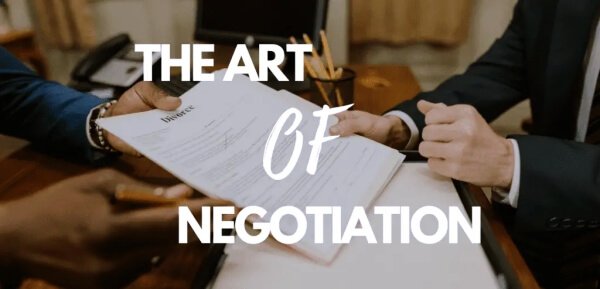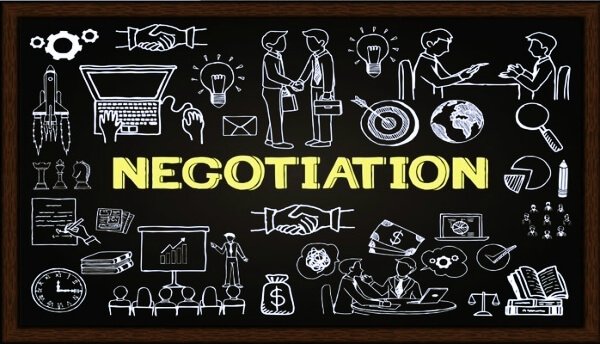Negotiation Nation is your one-stop shop for learning how to successfully negotiate for what you deserve. The ability to negotiate well is a superpower in the competitive world of today. These negotiation skills are crucial for reaching your objectives, whether they are getting a raise, getting your ideal apartment, or concluding a deal that will change the game.

Negotiation Nation Meaning And Examples
Negotiation Nation is a metaphorical term used in this blog post to represent a community or resource center focused on helping people develop their negotiation skills. It signifies a place where you can learn the art of getting what you deserve through effective negotiation.
Examples of Negotiation Nation in Action:
- Imagine someone struggling to negotiate a raise at work. They could subscribe to Negotiation Nation’s blog or attend their workshops to learn strategies for presenting their value and advocating for a higher salary.
- A young couple searching for an apartment might find helpful tips on Negotiation Nation about negotiating rent or securing concessions from the landlord, like getting free parking.
- Negotiation Nation could also be relevant for a business owner trying to close a deal with a client. They might find resources on the blog or through the community that teach them how to create win-win situations and secure favorable terms for both parties.
Related: Starting Your Investment Journey Without Feeling Overwhelmed

Negotiation Fundamentals And Skills
Mastering negotiation is like having a secret weapon in your pocket. Here at Negotiation Nation, we equip you with the building blocks for success. Let’s explore some fundamental principles and skills that will turn you into a negotiation pro:
Foundational principles:
- Before beginning any negotiation, determine your BATNA (Best Alternative to a Negotiated Agreement). This is your walk-away point—the absolute minimum consequence you will accept. A strong BATNA instills confidence and stops you from being coerced into terrible deals.
- Win-Win Mentality: Effective negotiation is not a battle. Seek solutions that benefit everyone concerned. This encourages long-term connections and increases trust.
- Active listening entails truly hearing what the other side is saying. Pay attention to both nonverbal and vocal cues. Understanding their demands enables you to adjust your approach.
Essential Skills:
- Effective communication entails expressing your views clearly and simply. Make powerful arguments supported by evidence (data, study, etc.). Use persuasive language without being aggressive.
- Maintain proper posture, make eye contact, and convey confidence. Avoid seeming unduly hostile or closed off with crossed arms.
- Questioning Techniques: Use open-ended questions to discover the other party’s needs and priorities. This might help you identify potential areas for compromise.
- Reading the room: Be aware of the other party’s emotions and change your approach accordingly. If they appear frustrated, take a break or make concessions.
- Negotiations are ongoing conversations. Be prepared to adjust your tactics when the circumstances change.
Related: Cost Of Convenience: Identifying And Eliminating Hidden Expenses

Main Purpose Of Negotiation
The main purpose of negotiation isn’t always to get exactly what you want but rather to reach a mutually beneficial agreement. This can involve several key goals:
- Finding common ground: Negotiation allows involved parties to identify areas of agreement despite potentially starting with different goals.
- Creating win-win solutions: The ideal outcome is a situation where everyone involved feels they’ve achieved something valuable. This fosters trust and strengthens relationships.
- Resolving conflict: Negotiation provides a structured way to address disagreements and find a solution that satisfies (or at least partially satisfies) all parties.
- Reaching an agreement: Ultimately, negotiation aims to establish a clear and accepted course of action or terms that everyone involved can abide by.
While getting the best possible outcome for yourself is certainly a factor, negotiation goes beyond just getting what you want. It’s about finding a creative solution that works for everyone at the table.
Related: Gig Economy Jobs That Offer The Best Bang For 2025

Benefits of Negotiation
Here are the advantages of mastering the art of negotiating.
Increase Your Income:
Negotiating your salary and perks can have a big impact on your financial well-being. According to studies, effective negotiators might earn up to 20% more than their non-negotiating peers.
Land the Perfect Job:
Negotiation involves more than simply compensation. You can also negotiate your preferred work schedule, responsibilities, and possibilities for advancement. This might assist you in finding a job that meets both your professional and personal needs.
Save Money:
Negotiation skills aren’t just for big purchases like automobiles or houses. You may also use them to save money on routine purchases like cable and phone services.
Build Stronger Relationships:
Effective negotiation fosters trust, respect, and a sense of collaboration. When both parties feel like they’ve gotten a fair deal, it strengthens the relationship and lays the groundwork for future collaboration.
Increase Your Confidence:
The more you negotiate, the more comfortable and confident you’ll become. Negotiation skills can empower you to stand up for yourself and advocate for your needs in any situation.
Gain Influence:
Strong negotiation skills can give you more influence in both personal and professional settings. People will be more likely to take your opinions and ideas seriously when they know you can effectively advocate for yourself.
Sharpen Your Problem-Solving Skills:
Negotiation is all about finding creative solutions to problems. The more you negotiate, the better you’ll become at identifying win-win solutions that work for everyone involved.
Improve Your Communication Skills:
Effective negotiation requires clear and concise communication. You need to be able to express your ideas persuasively and listen attentively to the other party. Negotiation can help you hone your communication skills in both written and verbal forms.
Become a Better Leader:
Negotiation skills are essential for any leader. Being able to negotiate effectively allows you to build consensus, resolve conflict, and achieve team goals.
Gain a Competitive Advantage: In today’s competitive world, negotiation skills are a valuable asset. Whether you’re applying for a job, closing a deal, or simply trying to get the best price on something, strong negotiation skills can give you an edge over the competition.
Related: Side Hustle Showdown: The Best Money-Making Gig For 2025

Mastering The Art Of Getting What You Deserve
The title “Mastering the Art of Getting What You Deserve” can be a bit misleading. Negotiation isn’t about brute force or getting everything you want at someone else’s expense. It’s about communication, collaboration, and achieving a win-win outcome.
Here’s how you can shift your mindset to become a master negotiator:
Know Your Worth:
Before entering any negotiation, define your value. What skills, experience, or resources do you bring to the table? Having a clear understanding of your worth empowers you to make confident requests.
Focus on Interests, Not Positions:
Negotiations can become mired down when parties become fixated on their original positions. Instead, concentrate on underlying interests. What does the other party genuinely require or want? Finding common ground in interests enables innovative solutions that benefit everyone.
Prepare to Walk Away:
Having a good BATNA (Best Alternative to a Negotiated Agreement) offers you leverage. Knowing your walk-away point keeps you from agreeing to a terrible bargain under pressure.
Don’t just wait for your turn to talk; instead, actively listen. Genuinely listen to the other party’s wants and concerns. This builds trust and helps you to adjust your approach for a mutually beneficial result.
Be Clear and Concise:
Communicate your needs and desires clearly and directly. Use persuasive language backed by evidence (data, past performance, etc.). Avoid being overly aggressive or demanding.
Embrace Collaboration:
Think of negotiation as a collaborative effort, not a battle. Work with the other party to find solutions that address everyone’s needs.
Negotiation is a skill that takes practice. The more you negotiate, the more comfortable and confident you’ll become. Negotiation Nation is here to guide you on this journey. We’ll equip you with the tools and strategies you need to become a master negotiator and achieve the results you deserve.
Related: Budgeting Bootcamp: From Zero To Hero In 5 Easy Steps

Differences Between Bargaining And Negotiation
Negotiation and bargaining are often used interchangeably, but there are key distinctions between the two. Here’s a breakdown to help you understand the difference:
Bargaining:
- Focus: Short-term, one-dimensional (usually price)
- Goal: Get the best deal possible, often at the expense of the other party.
- Style: Competitive, aggressive, “fixed-pie” mentality (limited resources, one wins, one loses).
- Outcome: Zero-sum game – one party wins big, the other loses big, or they settle for a compromise that leaves neither fully satisfied.
Negotiation:
- Focus: Long-term, multi-dimensional (considering various aspects of the deal)
- Goal: Find a win-win solution that benefits everyone involved.
- Style: Collaborative, problem-solving, “expanding the pie” mentality (finding creative solutions to benefit both parties).
- Outcome: Win-win agreement where both parties achieve their goals (or at least partially) and feel satisfied with the outcome.
Related: Debunking Money Myths: Separating Fact From Fiction In The Financial World

An analogy to illustrate the difference:
- Bargaining: Imagine two kids fighting over a slice of pie. Each child wants the bigger piece, and they won’t settle until they get it. This often results in ripped pie and unhappy kids.
- Negotiation: The two kids decide to work together. They cut the pie in half and then brainstormed ways to make it more enjoyable for both of them. Maybe they add ice cream or whipped cream. In the end, both kids get a delicious treat and feel happy with the solution.
In essence:
- Bargaining is a short-term, one-sided approach focused on getting the upper hand.
- Negotiation is a collaborative, long-term approach focused on finding solutions that benefit everyone involved.
By mastering negotiation skills, you can build stronger relationships, achieve better outcomes, and ultimately get what you deserve sustainably and positively.
Related: International Education Trends: Adapting To A Changing World

International Negotiations Between Countries
International negotiations between countries are a complex dance on the world stage. Unlike negotiations between individuals or businesses, they often involve multiple parties with diverse interests and priorities. Here’s a deeper dive into this intricate process:
Key Players:
- Government Representatives: Ambassadors, diplomats, and other government officials play a central role in representing their country’s interests and advocating for their positions.
- International Organizations: The United Nations, World Trade Organization, and other international bodies often serve as facilitators or mediators in negotiations, providing a neutral platform for dialogue.
- Non-State Actors: In some cases, influential NGOs or multinational corporations may also play a role in international negotiations, particularly regarding issues like human rights or environmental protection.
Factors at Play:
- National Interests: Each country enters negotiations with its own set of economic, political, and security goals. Understanding these motivations is crucial for reaching successful agreements.
- Geopolitical Landscape: Power dynamics, alliances, and existing conflicts between countries can significantly influence the course of negotiations.
- Cultural Differences: Negotiation styles and communication norms can vary greatly between cultures. Sensitivity and adaptability are essential for building trust and rapport.
- Long-Term Implications: International agreements can have lasting impacts. Negotiators must consider the long-term consequences of their decisions for their citizens and the global community.
Related: Winning Scholarships For Community College Students

Challenges and Opportunities
Finding Common Ground: Bridging differences in priorities and perspectives can be a significant hurdle. However, successful negotiations often lead to creative solutions that benefit all parties involved.
- Maintaining Stability: International negotiations play a vital role in fostering peace and stability in the world order. By addressing conflicts and establishing clear agreements, countries can minimize the risk of war or other international disputes.
- Promoting Cooperation: Negotiation can be a powerful tool for international cooperation on issues that transcend national borders, such as climate change, global health, and economic development.
Example of International Negotiations:
- Trade agreements, such as the North American Free Trade Agreement (NAFTA), are complex discussions between governments to lower trade obstacles and foster economic cooperation.
- Arms control and nuclear nonproliferation treaties necessitate sensitive talks to meet security concerns and prevent the spread of dangerous weapons.
- Climate change negotiations, such as the Paris Agreement, require international collaboration to address a worldwide environmental crisis.
International negotiations are a complicated but important component of global interactions. Understanding the numerous aspects involved allows us to comprehend the challenges and opportunities that occur when countries collaborate to address common issues and create a more peaceful and cooperative world.
Related: Automate Your Finances: Leverage Technology to Simplify Money Management
Conclusion
Mastering negotiation is an investment in oneself. By honing these talents, you’ll be able to seize new chances, strengthen existing relationships, and achieve your goals with greater confidence.
Don’t accept less than you deserve. Subscribe to Negotiation Nation and begin your journey toward being a confident and competent negotiator. Remember that with the appropriate approach, you may achieve your objectives and receive what you deserve.

